Paint Waste Disposal Tips
Learn the best way to get rid of your extra paint and supplies — from latex or oil-based to rollers and brushes.
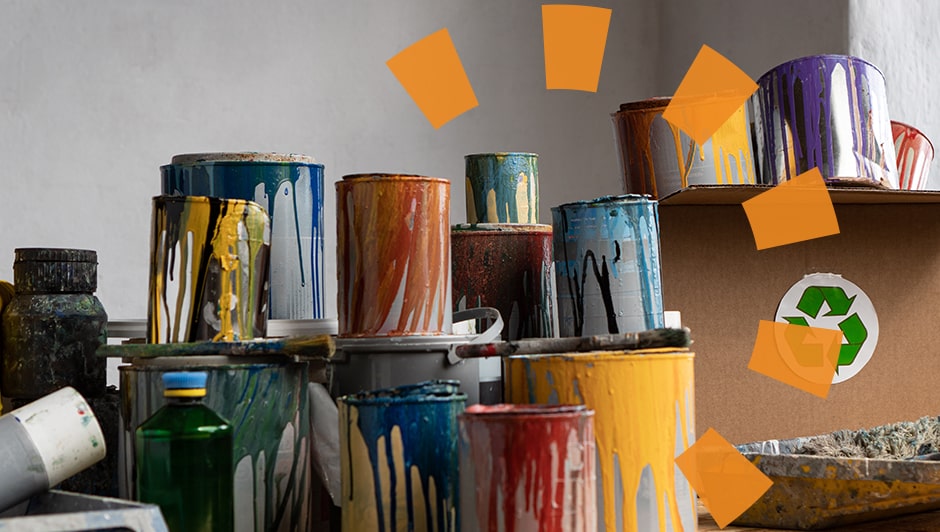
A Guide to Paint and Paint Supply Disposal
Wherever you’re reading this, chances are you’re probably within eyesight of paint. That’s because paint is one of the most versatile materials around. It can be used to color a home wall, transform the siding on a building or cover the patches in drywall from a plumbing project.
What most people don’t consider, though, is how to get rid of old paint when it's no longer needed. What do you do with all the supplies? The paint brushes, rollers, cans, tarps and everything else? Whether you’re a contractor looking for bulk paint disposal or a homeowner with a few extra paint buckets, we’ll give you the best disposal and recycling options available.
Rent dumpsters often? Discover more about our contractor services.

1. Sell Your Extra Cans
Paint resale is a vibrant market. There are countless people out there looking to refresh their homes with a nice coat of paint. However, most people only want to buy unused paint cans, and often are not willing to pay the prices you could get at Home Depot or Lowe’s – they’re looking for a deal.
Remember, if someone is interested in paint, they may also need supplies. Don’t hesitate to see if they would like to purchase your unused and gently used paintbrushes, drop cloths, rollers and other paint accessories.

Selling extra paint as a contractor can be a bit harder. You’re more than likely dealing with open cans that are nearly empty or a large number of unopened cans that you got in bulk. If you’re looking to sell, focus on local painting companies. If there aren’t competitors, they’re likely not opposed to buying paint in bulk.
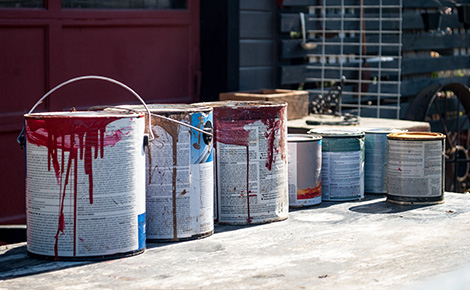
2. Donate Your Paint
Donating paint is one of the easiest ways to get rid of old paint, whether you’re a contractor or homeowner. From full cans to half-filled, most donation centers will be more than happy to take your paint and find a way to use it. The key to donation is to remember to call ahead. While all centers will be thankful for you considering them, they may not have the space for your supplies at the time.
Consider some of these nationwide resources along with any local charities:
- Habitat ReStores
- Local Stage Theaters
- Global Paint for Charity
- Homeless shelters planning upgrades
3. Reuse Your Leftovers
People tend to let paint sit around until they need it again. After all, chances are you’ll need to replace some drywall for a DIY improvement project or because someone slipped on the steps and put their knee through the wall. Having matching paint ready is quite handy. The best part? Paint doesn’t expire quickly.
Opened cans that are properly sealed for storage tend to last five years, while unopened cans can be good for around 10 years.
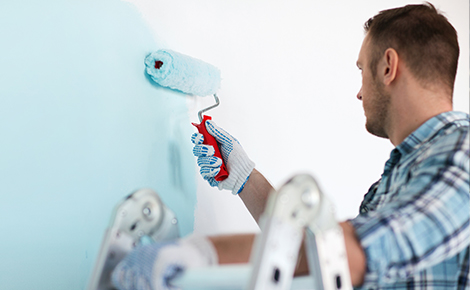
With a long shelf life, don’t hesitate to hold onto your unopened cans from a project and reuse them somewhere else. If you don’t want to deal with the hassle of cans that are mostly used, you can always ask the client if they would like to keep them.
Another option is to combine the paint dredges. This usually creates a darker neutral color that can be used in many places. Just be sure you’re mixing the same type of paint – do not mix oil-based and latex! Not only will it make the paint less effective when used, but it also makes the latex paint a hazardous item. That means it’s harder to dispose of.
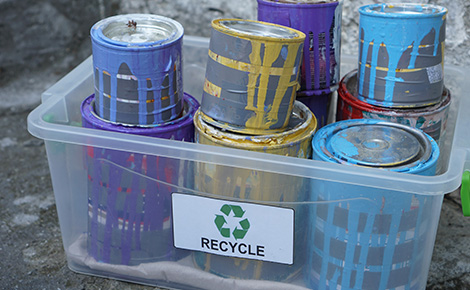
4. Find a Recycler
Most paint supplies are recyclable since they are primarily made of metal, plastic or wood. Check with your local trash company to see if there are any specific restrictions on how clean the supplies must be.
As for paint, there are a few options to consider for nationwide recycling programs:
- Paint manufacturers
- Local government recycling programs
- Hardware and home improvement stores
Try using PaintCare to easily locate a nearby drop-off location. If you’re a contractor with lots of paint to recycle, you can schedule a pickup.
5. Rent a Dumpster
When you have a lot of paint and supplies to toss, renting a dumpster is often your best option. The container is delivered right to your home or jobsite, and loading only requires you to walk to the bin. No driving to recycling facilities or calling around to see if donation spots are accepting materials. The biggest consideration is to ensure the paint is dried, as wet paint is not allowed in dumpsters.
Working on a project that may take a long time or require extra dumpsters? We’ve got you covered. Our contractor account teams are ready to help with your ongoing roll off dumpster rental needs.
Remember, paint chips that contain lead may not be accepted in dumpsters. Check with your rental company to ensure they’ll take it and avoid being charged a prohibited item fee.
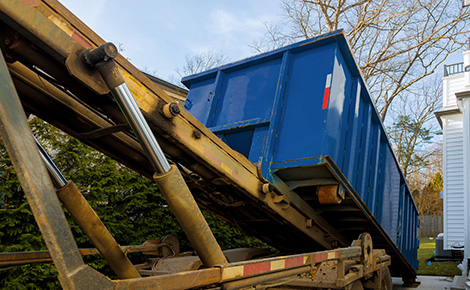
Order a Dumpster Online
Shopping after hours? Too busy to make another call? Book the dumpster you need, when you need it. Order your dumpster online 24/7.

Can I Throw My Paint and Supplies in a Dumpster?
This is a common question we get. And, unfortunately, the answer isn’t as straightforward as a “yes” or “no.” Factors such as the type of paint, the chemicals used to strip the paint and even how much you’re tossing can impact the answer. We’ve put together some guidelines to help you decide if your materials are safe for disposal. If you have any questions about your specific waste, our team is available at 877-814-9781.
Latex
This material can go in a dumpster with some precautions taken first. Since it's a non-hazardous material, latex paint disposal is a simple enough process for homeowners and contractors alike. Simply take the lids off the can, and ensure the paint has fully dried before tossing it in the dumpster. If you’d rather not wait, consider adding kitty litter to the paint to help speed up the process.
Oil-Based
Oil-based paints are not allowed in dumpsters. That’s because the EPA considers them hazardous waste, as the chemicals in the paint can harm the ozone layer if improperly disposed of. Check with your local government to find drop-off locations for oil-based paint disposal.
Industrial
Industrial paint is the most complex. In short, yes, it can sometimes go in a dumpster. However, it depends on the chemicals used to create the paint. That list of chemicals is wide-ranging. So, if you’re dealing with industrial paint disposal, your best bet is to give us a call.
Painting Supplies
Painting supplies are most likely to be accepted in dumpsters. Items like empty cans, paint trays and drop clothes are often accepted provided any paint is dry. Things like rags, rollers and paintbrushes are also often accepted, but come under more scrutiny. These items are more likely to come in contact with and absorb hazardous liquids like cleaners and solvents. It’s best to provide a list of items to your dumpster company and ask if they are accepted.

Pro Tip
Whether you’re a contractor or a homeowner, it never hurts to reach out to us at 877-814-9781. You may find that we can take your difficult-to-toss materials to a proper facility for disposal.
Getting Rid of More Than Paint and Supplies?
Choose a construction material for detailed disposal options.
 Dirt Dirt |
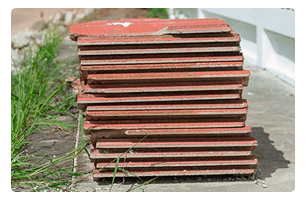 Tile Tile |
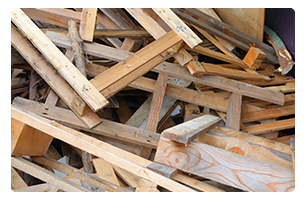 Pallets Pallets |
 Carpet Carpet |
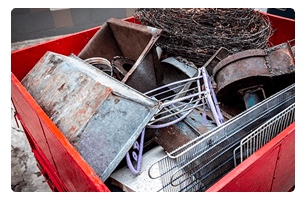 Scrap Metal Scrap Metal |
 Concrete Concrete |
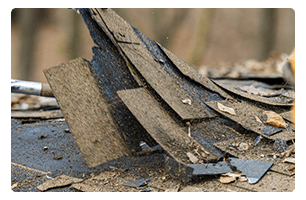 Shingles Shingles |
 Insulation Insulation |
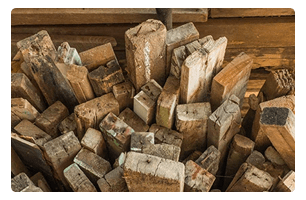 Lumber Lumber |
Paint Disposal FAQs
Can you throw away empty paint cans?
Regulations vary depending on the type of paint can.
- You can throw away a latex paint can as long as it is completely dry.
- Industrial and oil-based paint cans must be cleared of all paint remnants. Otherwise, the can is hazardous waste and must be discarded accordingly.
Is paint considered hazardous waste?
Oil-based and industrial paints are always considered hazardous. Latex paint is only considered hazardous waste when wet. Please check with your local government for disposal options.
How long does it take for a can of paint to dry out?
Depending on how full a paint can is, it can take a few days to dry. You can speed up the process by adding absorbent materials like kitty litter or shredded newspaper.
Can you recycle paint?
There are a few options for nationwide paint recycling. Check with:
- The paint manufacturer
- Your local government
- Local home improvement stores
To see if they offer a recycling program. You can also visit PaintCare to locate a nearby drop-off location.
Can you put paint cans in a dumpster?
You can put dried-out latex paint cans in a dumpster. Consider placing them in a plastic bag as an added precaution. Oil-based and industrial paint cans are almost always considered hazardous waste, and are not allowed in dumpsters. Reach out to our team for expert guidance.
Additional Disposal and Recycling Resources
Looking for other tips on handling construction debris? Check out the advice in our blog posts and resources to learn more.
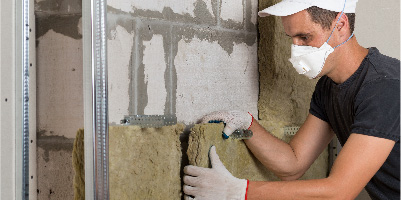
Project Tutorials:
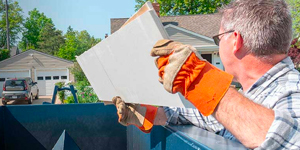
Dumpster Rental Tips:
